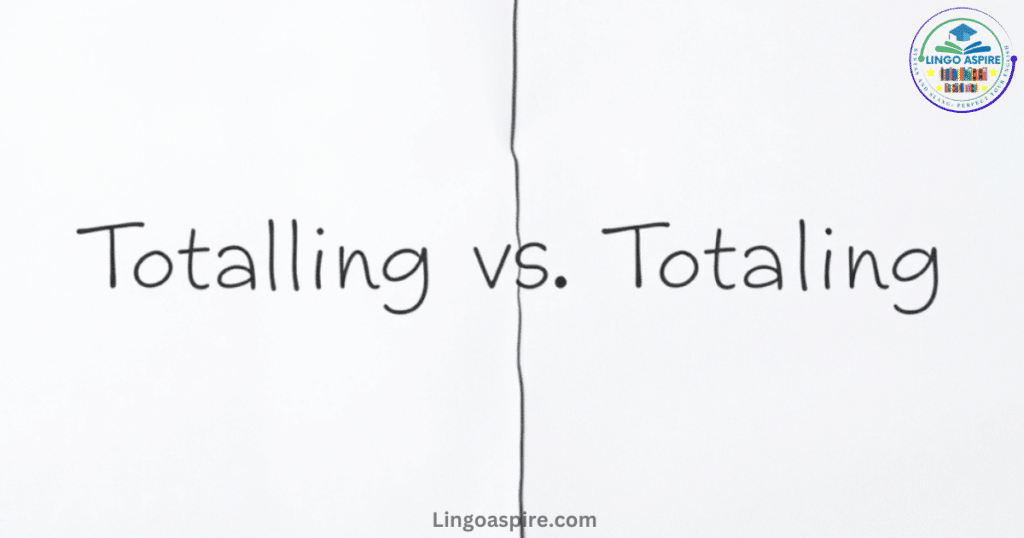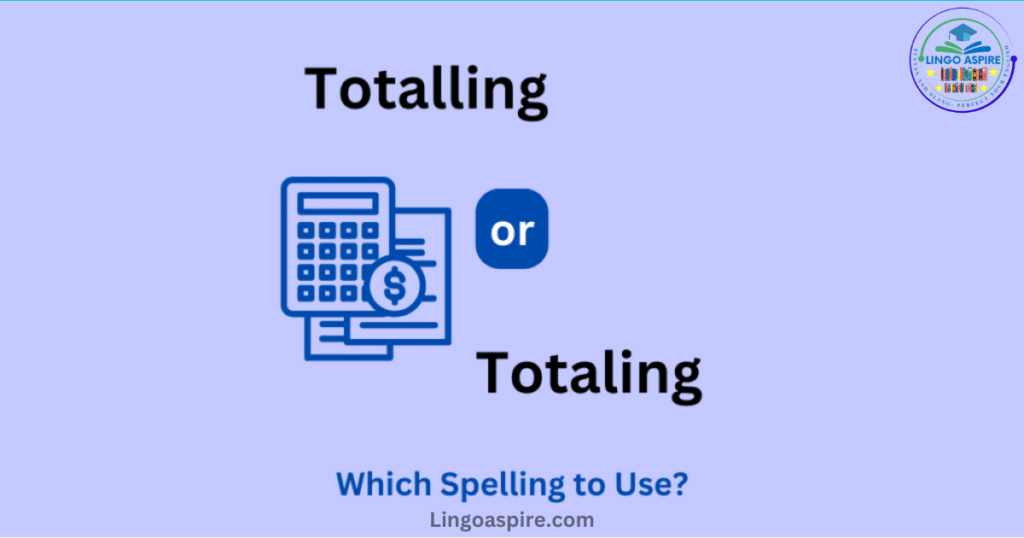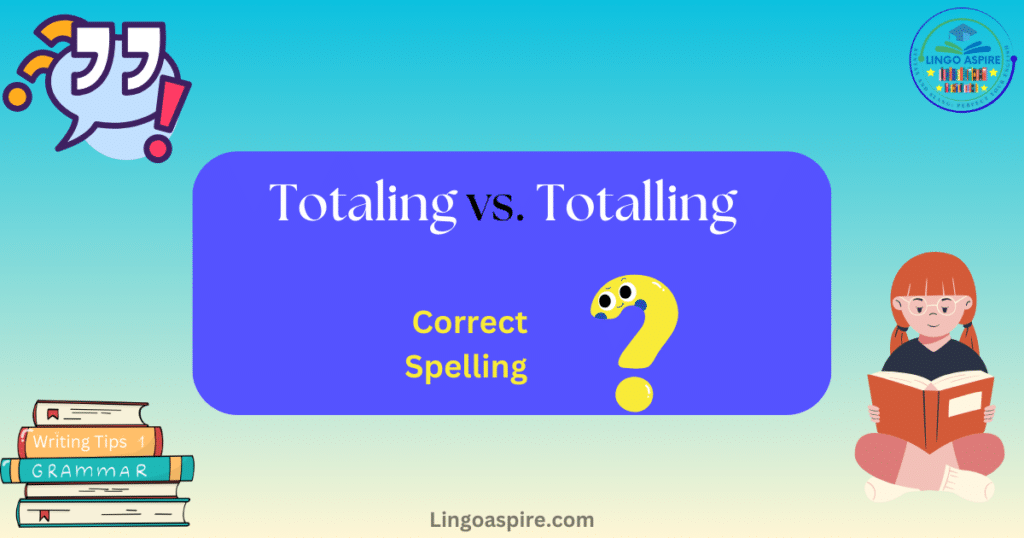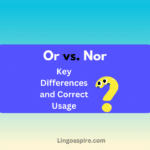Many people get confused when they see two different spellings of the same word: “totaling vs. totalling. Both versions exist, but they belong to different types of English. This confusion often appears in writing, especially in formal documents, academic papers, and professional emails. But why does this happen? The difference is mainly due to American and British English spelling rules. In this article, we will explain the meaning, usage, spelling rules, and history behind these variations.
If you have ever wondered whether to write “totaling” or “totalling,” this guide will provide all the answers. Understanding the right spelling can help you write correctly based on your audience and location.
What Do Totaling vs. Totalling Mean?

The word “totaling” (or “totalling”) comes from the verb “to total,” which means to add up, sum, or calculate a final amount. It is often used when referring to numbers, costs, or damages.
For example, if a car accident results in damage that costs more than the car’s value, people might say, “The car was totaled.” This means it is beyond repair. In business, accounting, and daily calculations, people frequently use “totaling” or “totalling” when referring to the final sum of numbers.
Totaling vs. Totalling: The Key Difference
The key difference between “totaling” and “totalling” lies in the number of ‘L’s in the word.
- Totaling → Used in American English
- Totalling → Used in British English
This difference follows a common pattern in English where verbs ending in a vowel + “L” double the “L” in British English when adding “-ing,” but remain single in American English.
For example, British English uses “travelling,” “cancelling,” “modelling,” while American English uses “traveling,” “canceling,” “modeling.”
Comparison Table: Totaling vs. Totalling
| Spelling | Used in Example Sentence | Example Sentence | |
|---|---|---|---|
| Totaling | American English | “The expenses are totaling $5,000.” | |
| Totalling | British English | “The damages are totalling £2,500.” |
Why Is There Confusion?
The confusion exists because English spelling is not universal. American English has simplified many words by removing extra letters, while British English retains traditional spelling. The difference goes back to the 19th century when Noah Webster, an American lexicographer, introduced spelling reforms to make English easier.
For example, words like “colour” (British) became “color” (American) and “centre” (British) became “center” (American). These spelling changes were designed to make writing and pronunciation more consistent. Since “total” ends in a vowel + “L,” British English follows the doubling rule, while American English simplifies it.
Grammar Rule: When to Double the “L” in Verbs
A common rule in English explains when to double the final consonant when adding “-ing” or “-ed.” This rule applies to words ending in a single vowel + consonant:
- Double the last letter if the stress is on the last syllable (e.g., “begin” → “beginning”).
- Do not double the letter if the stress is on the first syllable (e.g., “visit” → “visiting”).
Let’s compare “total” with other similar words:
| Word | American English | British English |
|---|---|---|
| Travel | ✓ | ✓ |
| Traveling | ✓ | |
| Travelling | ✓ | |
| Cancel | ✓ | ✓ |
| Canceling | ✓ | |
| Cancelling | ✓ | |
| Model | ✓ | ✓ |
| Modeling | ✓ | |
| Modelling | ✓ | |
| Label | ✓ | ✓ |
| Labeling | ✓ | |
| Labelling | ✓ |
Since “to-tal” has stress on the first syllable, American English follows the rule without doubling the L, while British English doubles it by tradition.
Examples of “Totaling” and “Totalling” in Sentences
Using these words in sentences can help clarify their usage:
Totaling in American English:
- The cost of the renovations is totaling $12,000.
- The company is totaling sales data for the last quarter.
- After the accident, the insurance agent said the car was totaling too much to repair.
Totalling in British English:
- The expenses for the holiday are totalling £1,500.
- The committee is totalling the votes for the election.
- The damages from the storm are totalling thousands of pounds.
Properly use Totaling vs. Totalling

Here’s how you can properly use “totaling” and “totalling” in sentences based on American and British English conventions:
Usage in American English (“Totaling”)
- The expenses are totaling over $5,000 this month.
- He is totaling the receipts for tax purposes.
- The damage from the storm is totaling millions of dollars.
Usage in British English (“Totalling”)
- The losses are totalling more than £10,000.
- She is totalling all the votes before announcing the winner.
- The project’s cost is totalling an estimated £50 million.
Both spellings are correct depending on the region. “Totaling” is preferred in the U.S., while “totalling” is standard in the U.K. and other Commonwealth countries.
Synonyms and Alternative Words for “Totaling” and “Totalling”
If you want to avoid confusion, you can use alternative words instead of “totaling” or “totalling.” Here are some synonyms:
- Adding up
- Summing up
- Calculating
- Counting
- Computing
- Assessing
- Evaluating
For example, instead of saying “The expenses are totaling $500,” you could say “The expenses are adding up to $500.”
Case Study: Real-World Examples of “Totaling” vs. “Totalling”
A study of published news articles and books shows a clear difference in usage. A review of The New York Times (American English) and The Guardian (British English) reveals the following:
- The New York Times uses “totaling” exclusively.
- The Guardian uses “totalling” in all articles.
Similarly, academic papers from Harvard University (USA) use “totaling,” while research from Oxford University (UK) prefers “totalling.” This shows that spelling depends entirely on the region and the audience.
Conclusion
The difference between “totaling” and “totalling” is simple: American English prefers “totaling,” while British English uses “totalling.” The reason lies in spelling conventions, grammar rules, and historical reforms.
When writing for a British audience, use “totalling” to maintain correct regional spelling. When writing for an American audience, “totaling” is the proper choice. If you want to avoid confusion altogether, you can use synonyms like “adding up” or “summing up.”
Understanding these differences helps you write clearly and professionally, ensuring your spelling matches your audience. Next time you come across “totaling” or “totalling,” you’ll know exactly which one to use!
Sources
- Merriam-Webster Dictionary – Explanation of American vs. British spelling conventions.
- Oxford English Dictionary – Detailed history and etymology of “totaling” and “totalling.”
- Cambridge Dictionary – Definitions, examples, and usage of “totaling” and “totalling.”







